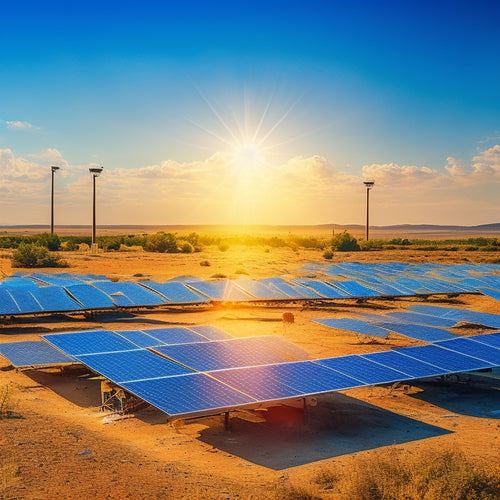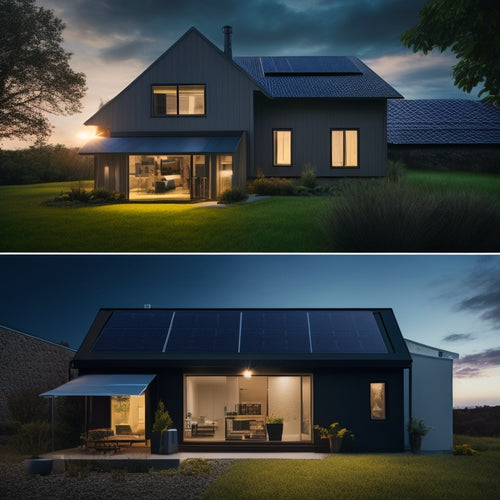
Solar Panel Setup Cost
Share
You can invest in a solar panel setup for a relatively affordable upfront cost, typically ranging from $15,000 to $30,000, depending on the system size and quality, which will help you reduce your carbon footprint and start saving on energy bills. This financial investment can lead to significant long-term savings, as solar panels reduce your reliance on the grid, lowering your operating costs. Additionally, solar incentives, like tax credits, can offset the initial setup cost. By understanding your energy demands and system sizing, you'll access the full potential of your solar panel setup, and exploring further will reveal more benefits and opportunities to maximize your return on investment.
The Essentials
- The cost of a solar panel setup varies based on system size, with larger systems yielding greater energy savings and lower bills.
- Average savings vary by system size, with a 2 kW system saving $300-$450 annually, a 5 kW system saving $750-$1,050, and a 10 kW system saving $1,500-$2,100.
- The Solar Investment Tax Credit (ITC) offsets initial setup costs, making renewable investments more accessible and contributing to a sustainable energy future.
- Installation costs can be recouped through energy savings and potential government rebates, with an average return on investment of $1.17 for every dollar spent.
- Energy independence is achieved by generating one's own electricity, minimizing grid reliance, and reducing reliance on non-renewable energy sources.
Reduce Carbon Footprint Now
You're taking an important step towards reducing your carbon footprint by considering a solar panel setup.
By tapping into the power of the sun, you'll be utilizing an eco-friendly energy source that greatly minimizes greenhouse gas emissions.
With renewable energy solutions, you can break free from reliance on the grid and reduce your electricity bills, while also contributing to a cleaner environment.
Eco-Friendly Energy Source
With the growing awareness of climate change, moving to an eco-friendly energy source has become a pressing concern for many individuals and organizations. You're likely evaluating solar panels as a viable option to reduce your carbon footprint. By utilizing renewable technology, you'll not only minimize your environmental impact but also enjoy solar incentives like government rebates.
Here's a breakdown of the benefits:
| Benefits | Description |
|---|---|
| Energy Independence | Generate your own electricity and reduce reliance on the grid |
| Sustainable Practices | Contribute to a cleaner environment with zero emissions |
| Cost Savings | Enjoy lower energy bills and potential government rebates |
When you decide to go solar, you'll need to examine the installation process, grid integration, and system maintenance. Fortunately, solar financing options are available to help make the change smoother. By making the switch, you'll be taking a significant step towards reducing your carbon footprint and promoting a sustainable future.
Go Green Today
One essential step in reducing your carbon footprint is to assess your energy consumption habits and identify areas for improvement.
You need to understand where your energy is being spent and what changes you can make to reduce your reliance on non-renewable sources. By doing so, you'll be able to pinpoint opportunities to switch to renewable energy sources, like solar power.
With a home solar power battery, you can capture and store excess energy generated by your solar panels during the day, enabling you to power your home at night or during power outages without incurring additional costs off-grid solar batteries.
Investing in solar panels is a great way to reduce your carbon footprint. Not only do you benefit from clean energy, but you also take advantage of solar incentives, such as tax credits and rebates.
These incentives can greatly reduce the initial solar panel setup cost, making renewable investments more accessible.
Increases Property Value Fast
You'll find that installing solar panels enhances your property's selling price and attracts more home buyers.
In fact, homes with residential solar panels often have higher resale values due to the energy efficiency and eco-friendly features they provide.
A study by the National Renewable Energy Laboratory found that solar panels can increase your property's value by up to $15,000.
With solar panels, you'll appeal to environmentally conscious buyers and set your property apart from others on the market.
Boosts Selling Price
About 80% of homebuyers consider energy efficiency a high or very high priority, and solar panels greatly contribute to this appeal. By installing solar panels, you'll not only reduce your energy bills but also increase your property's value.
This, in turn, enhances your selling price, making your investment more attractive to potential buyers. According to market trends, solar panels can increase your property's value by up to 17%.
This means that for every dollar you invest in solar panels, you can expect an investment return of around $1.17. Additionally, properties with solar panels tend to sell faster and for higher prices compared to those without.
Attracts Home Buyers
Solar-powered homes are in high demand, and installing solar panels can greatly enhance your property's appeal to eco-conscious and cost-savvy homebuyers.
You'll attract a specific type of buyer who prioritizes energy efficiency and reducing their carbon footprint. These buyers are often willing to pay a premium for a home that meets their environmental standards.
According to recent real estate trends, homes with solar panels sell faster and for higher prices than those without. You can capitalize on this trend by highlighting your solar panel setup as a major selling point.
Many home buyer incentives, such as federal tax credits and state-specific rebates, can also offset the initial cost of installation.
When marketing your property, be sure to emphasize the long-term savings and environmental benefits of solar power. This will connect with buyers who value energy independence and reducing their reliance on the grid.
Efficient Energy Storage Systems
You'll want to contemplate energy storage solutions that optimize your solar panel setup's performance, such as residential solar batteries and deep cycle batteries that store excess energy for later use, allowing you to utilize the full potential of renewable energy.
These systems guarantee you have a reliable source of power during grid outages or when the sun isn't shining.
Energy Storage Solutions
Energy storage solutions, a critical component of your solar panel setup, enable you to employ the sun's energy even when it's not shining. This means you can power your home or business during the night or on cloudy days, reducing your reliance on the grid and increasing your energy independence.
When selecting an energy storage solution, you'll want to evaluate solar battery technologies that integrate seamlessly with your renewable energy system. Look for solutions that offer efficient charging and discharging, as well as advanced monitoring and control systems. This will guarantee you're maximizing your energy storage capacity and minimizing waste.
Effective energy storage solutions also enable you to optimize your renewable energy integration. By storing excess energy generated during the day, you can reduce your energy consumption from the grid during peak hours, saving you money and reducing your carbon footprint.
With the right energy storage solution, you can enjoy a more reliable, efficient, and sustainable energy system that gives you the freedom to live off the grid.
Battery Backup Systems
Battery backup systems are designed to provide efficient energy storage, allowing you to tap into your stored renewable energy when the grid goes down or during periods of high demand.
With a battery backup system, you can enjoy energy independence, reducing your reliance on the grid and lowering your energy bills.
When evaluating a battery backup system, it's vital to think about system compatibility, ensuring that your solar panel setup and battery storage work seamlessly together.
You'll also want to reflect on installation tips, such as choosing a location that's easily accessible for maintenance.
Speaking of maintenance, battery lifespan and maintenance requirements are significant factors to examine.
Fortunately, technology advancements have led to more efficient and cost-effective options.
You may even be eligible for solar incentives, which can help offset the cost of your system.
Additionally, financing options are available to help make your energy independence dreams a reality.
Assess Your Energy Demands
You need to calculate your daily energy consumption to determine the required solar panel capacity.
To guarantee you're on the right track, consider incorporating energy-efficient homes and building insulation materials(https://www.illchanterl.com) into your overall strategy.
Start by identifying the total appliance wattage in your household, including lighting, refrigeration, and entertainment systems.
This information will help you size your solar panel setup accurately and guarantee it meets your energy demands.
Daily Energy Consumption
To accurately size a solar panel setup, it's essential to determine how much power your household consumes daily. This involves understanding your energy usage patterns to guarantee you generate enough electricity to meet your needs.
You'll need to track your energy consumption over a period, typically a month, to get an accurate depiction. You can do this by monitoring your utility bills, which should provide a breakdown of your daily energy usage in kilowatt-hours (kWh).
Alternatively, you can use energy tracking devices or smart plugs to monitor individual appliances and gadgets. This consumption analysis will help you identify areas of high energy usage and opportunities to reduce your energy consumption.
Be sure to account for seasonal variations, such as increased energy usage during winter or summer months.
Total Appliance Wattage
Now that you have a clear understanding of your daily energy consumption, it's time to assess your energy demands by calculating the total appliance wattage. This step is essential in determining the size of the solar panel system you'll need to meet your energy requirements.
To calculate the total appliance wattage, you'll need to identify all the appliances you plan to power with your solar panel system, including lights, refrigerators, air conditioners, and computers.
Make a list of each appliance, along with its wattage rating, usually found on the manufacturer's label or in the user manual. Be sure to take into account the appliance efficiency, as some appliances may have varying wattage ratings depending on their mode of operation.
For example, a laptop may consume 50 watts when idle but 100 watts when in use. Add up the wattage ratings of all your appliances to get the total appliance wattage. This will give you an accurate estimate of your energy demands, allowing you to proceed with the wattage calculation for your solar panel system.
Lower Operating Costs Guaranteed
You'll save money on your energy bills as soon as your solar panel system is up and running.
With solar power, you'll generate free energy during the day, reducing your reliance on the grid and lowering your operating costs.
Energy Savings Guaranteed
With a solar panel setup, your energy savings are guaranteed through a significant reduction in your electricity bills. You'll enjoy lower operating costs, and the financial benefits will keep adding up. Solar incentives, such as the Solar Investment Tax Credit (ITC), can also help offset the initial setup cost.
Here's a breakdown of the average energy savings you can expect:
| System Size | Average Electricity Savings | Average Annual Savings |
|---|---|---|
| 2 kW | 200-300 kWh/month | $300-$450 |
| 5 kW | 500-700 kWh/month | $750-$1,050 |
| 10 kW | 1000-1400 kWh/month | $1,500-$2,100 |
As you can see, the larger the system, the greater the energy savings. With a solar panel setup, you'll be generating your own clean energy and reducing your reliance on the grid. This means lower electricity bills and a significant reduction in your carbon footprint. You'll be enjoying the financial benefits of solar energy while contributing to a cleaner, more sustainable future.
Frequently Asked Questions
Can I Install Solar Panels on My Own?
You can attempt a DIY installation, but it's essential to weigh the cost savings against potential risks and complexity, ensuring you're comfortable with electrical work and local building codes to avoid costly mistakes.
Do Solar Panels Work During Power Outages?
You're wondering if solar panels work during power outages; the answer is yes, if you have a battery backup system, ensuring grid independence and continued energy savings when the grid goes down.
How Long Does a Solar Panel Last?
You invest in a solar panel, expecting a long-term return; its lifespan typically ranges from 25 to 30 years, depending on factors affecting durability, such as quality, maintenance, and environmental conditions, ensuring your freedom from reliance on the grid.
Can I Use Solar Panels With My Existing Roof?
You'll need to assess your roof's suitability for solar panels, considering factors like age, condition, and orientation. If it meets installation requirements, you can proceed with a hassle-free setup, enjoying the freedom to utilize renewable energy on your terms.
Are Solar Panels Resistant to Hail and Extreme Weather?
You'll be relieved to know that solar panels are designed to withstand hail damage and extreme weather conditions, boasting impressive weather durability thanks to their tempered glass or polymer construction, ensuring your freedom from energy dependence isn't compromised.
Final Thoughts
You're on the cusp of a renewable energy revolution! With a solar panel setup, you'll slash your carbon footprint, enhance your property's value, and enjoy efficient energy storage. By evaluating your energy demands, you'll release lower operating costs, guaranteed. The question is, what's holding you back? Take the leap and join the sustainable energy movement. The future is bright - and it's powered by the sun. Now, go ahead and utilize its energy!
Related Posts
-

Solar Phone Chargers for Camping Essentials
Solar phone chargers are must-haves for your camping essentials, allowing you to stay connected while enjoying nature...
-

What Happens Without a Charge Controller in Solar Panels
Without a charge controller in your solar panel system, you risk overheating batteries due to overcharging, which can...
-

Cost of Home Solar Battery
You're looking to invest in a home solar battery to reduce your grid reliance, but you're curious about the cost. The...


